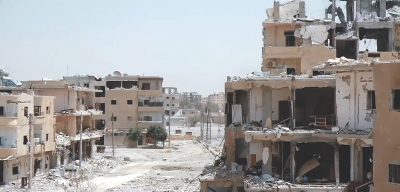
by: Kate Norman, BFP Staff Writer
For the past several years, Israel has been engaging in a shadow war with Iran. The clerics in Tehran seek to wipe the “Zionist enemy” off the map and extend their influence across the Middle East, while Jerusalem seeks to thwart Iran’s regional and nuclear ambitions. Without an outright showdown on the battlefield, the Jewish state and the Islamic Republic have been striking at each other in more covert ways over the past few years.
Iran attacks Israel through proxies. Tehran orders its terror puppets—for example, the Lebanon-based Hezbollah terrorist organization and the Gaza-based Hamas and Palestinian Islamic Jihad (PIJ) terrorist groups—to attack Israel from all sides and even to deploy lone-wolf terror attacks within Judea and Samaria, the biblical heartland.
 Iran fed into the chaos of the Syrian Civil War, utilizing the war-torn land as an opportunity to entrench itself further across the Middle East. Syria became a training ground for Iranian fighters and a shipping route for advanced weapons bound for Hezbollah. The leadership in Jerusalem has vowed to prevent Iran from entrenching itself at Israel’s doorstep, and the Israeli military sporadically conducts air strikes in Syria, targeting terror sites and weapons shipments belonging to Iran and its proxies.
Iran fed into the chaos of the Syrian Civil War, utilizing the war-torn land as an opportunity to entrench itself further across the Middle East. Syria became a training ground for Iranian fighters and a shipping route for advanced weapons bound for Hezbollah. The leadership in Jerusalem has vowed to prevent Iran from entrenching itself at Israel’s doorstep, and the Israeli military sporadically conducts air strikes in Syria, targeting terror sites and weapons shipments belonging to Iran and its proxies.
The Islamist regime also strikes at Israeli-owned cargo ships. In February, Tehran targeted an oil tanker owned by an Israeli billionaire in the Persian Gulf with suicide drones and in November, Iran used a suicide drone to attack another tanker owned by an Israeli shipping magnate off the coast of Oman.
Iran blamed Israel for several assassinations over the span of a few weeks in the summer of 2022 that eliminated the regime’s top military chiefs and nuclear scientists, hobbling Tehran’s nuclear development program.
Around the same time, then-Foreign Minister Yair Lapid advised Israelis traveling to Turkey, a popular vacation spot, to leave the country “as soon as possible,” warning that they faced a “real and immediate danger.”
The danger, Lapid warned, was Iran’s attempt at avenging the assassinations: by carrying out terror attacks or kidnappings of Israelis in foreign countries.
In late 2022, Elizabeth Tsurkov, an Israeli researcher who also carries a Russian passport, used her second passport to enter Iraq and conduct research for her doctorate on Shiite movements in Iraq. The 36-year-old PhD candidate from Princeton University reportedly had traveled to Iraq some 10 times on her Russian passport, in addition to Jordan, Syria and Turkey.
It is illegal for Israelis to travel to enemy countries—which includes Iraq—on a foreign passport. The former head of Iraqi intelligence became aware of Tsurkov’s travels and sent a warning to the US and Russia informing them that her activities were “endangering her,” Channel 12 reported.
Fearing for her safety, Israeli officials then sent Tsurkov multiple warnings. Their warnings went unheeded, and things took a turn for the worse once her research contacts discovered that she was Israeli, Arab sources told Israel’s Channel 12 news.
Tsurkov went missing at the end of March and is believed to have been abducted by the Kataib Hezbollah, an Iraqi Shiite paramilitary group that is distinct from the Lebanon-based Hezbollah terrorist organization. Like Hezbollah, however, the Kataib Hezbollah also takes direct orders from Tehran.
In July, London-based Arabic newspaper Asharq Al-Awsat reported, citing Iraqi sources, that Tsurkov’s kidnapping was intended to pressure Israel to release an Iranian it was holding in custody.
The Times of Israel postulated that the Iranian held in Israeli custody could be Yousef Shahbazi Abbasalilo. The Mossad, Israel’s intelligence agency, announced in June that it had captured Abbasalilo in Iran and interrogated him, leading to a confession that he had been involved in a plot with the Islamic Revolutionary Guard Corps (IRGC) to kill Israeli businessmen in Cyprus.
 Israel’s National Security Council (NSC) issued a statement in March warning Israelis to think twice about traveling abroad—particularly to certain countries—amid a threat of terrorism against Israelis overseas.
Israel’s National Security Council (NSC) issued a statement in March warning Israelis to think twice about traveling abroad—particularly to certain countries—amid a threat of terrorism against Israelis overseas.
The danger stems from Iran, “the main generator of global terrorism,” the NSC warned, particularly with proxy elements who had attempted attacks and kidnappings against Israelis in Georgia, Turkey, Cyprus and other countries. “We estimate that Iran will continue to use terrorist acts as a tool to achieve its main goals and will continue to work to promote damage to Israeli and Jewish targets around the world,” the organization warned. Danger zones include the United Arab Emirates, Georgia, Azerbaijan, Greece, Turkey, Bahrain, Cyprus and Iraq.
The NSC repeated its warning in August, ahead of the Fall Feasts, highlighting again the dangers of Iran and its interest in harming Israelis and Jews around the world. The NSC also reiterated the ban for Israelis traveling to enemy countries—including Lebanon, Syria, Iraq, Yemen and Iran—with foreign passports. The organization even noted Tsurkov and her kidnapping as an example of the danger.
The alert is similar to Lapid’s warning to Israelis to leave Turkey in the summer of 2022, following the string of alleged Israeli assassinations of Iranian military and nuclear chiefs. In fact, Lapid announced at the time that Israel and Turkey together had thwarted attempts by Iranian operatives to kidnap or kill Israeli citizens visiting the country, particularly in Istanbul. He even said some Israelis had traveled to Turkey and returned to Israel “without knowing their lives were saved.”
Israel is under constant threat from Iran and its proxies. The Jewish state must constantly be on guard to defend its borders from attacks by Hezbollah in the north and Hamas and the PIJ in Gaza. The Iran-backed Palestinian terrorist groups also, following orders from Iran, attempt to sow chaos in Israel’s heartland by plotting terror attacks. Israeli-owned ships passing through the Persian Gulf and the Gulf of Oman must remain wary of Iranian drones.
And Israeli citizens traveling abroad must also take care. Even during their holidays, citizens of the Jewish state in certain parts of the world have to look over their shoulders, careful not to become the next target and bargaining chip for the clerics in Iran.
Photo Credit: Click on photo for photo credit
Photo License: Destroyed neighbourhood in Raqqa, Syria
Photo License: Pacific Zircon tanker
All logos and trademarks in this site are property of their respective owner. All other materials are property of Bridges for Peace. Copyright © 2025.
Website Site Design by J-Town Internet Services Ltd. - Based in Jerusalem and Serving the World.